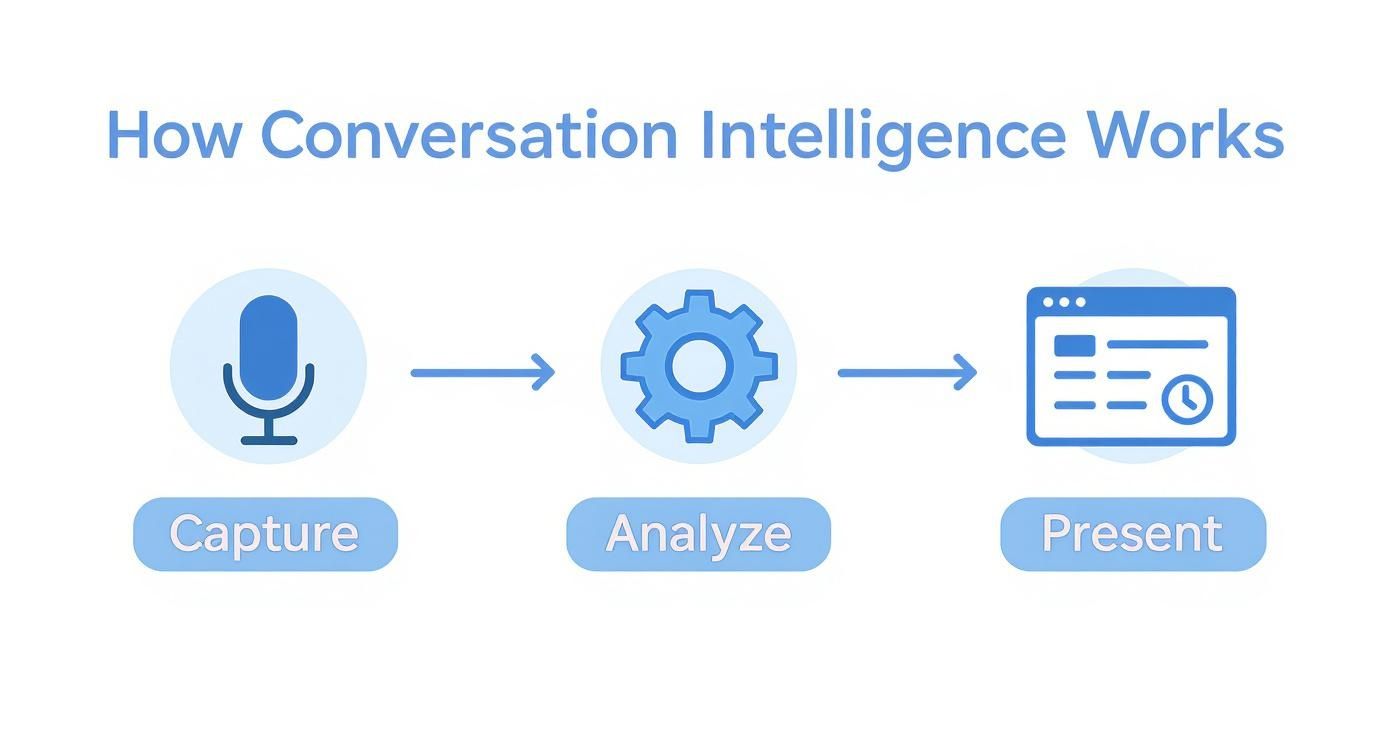
You're a founder. You know your customers are talking, but are you really listening? That’s where conversation intelligence comes in. It’s an AI-powered system that analyzes customer interactions—from sales calls to Reddit threads—to give you a clear picture of what your audience truly wants, needs, and feels about your brand.
Your Customers Are Talking, But Are You Listening?

For years, "listening" meant manually digging through emails, relying on half-remembered notes from sales calls, and scrolling through social media. It was scattered, slow, and mostly guesswork. You’d catch fragments, but never the whole story.
This old way is reactive. You hear about a problem only after it’s a big deal, or you find out what a customer wants after they’ve gone to a competitor. It’s like trying to navigate a maze blindfolded.
The Shift To Data-Driven Listening
Conversation intelligence flips the script. It's your ultimate listening tool, working 24/7. Instead of just picking up on keywords, it digs deeper to understand context—customer sentiment, their intent, and trends bubbling up just below the surface.
This technology helps you move from guessing what customers want to knowing what they need. It takes all the unstructured chatter across your channels and turns it into a clear, actionable roadmap for growth. It’s the difference between occasionally checking in and having a constant, real-time pulse on your market.
The old manual methods just can't keep up. The difference is stark when you see them side-by-side.
From Manual Guesswork to AI-Powered Insight
| Manual Approach | Conversation Intelligence |
|---|---|
| Relies on anecdotal feedback | Uses comprehensive data from all interactions |
| Time-consuming and inefficient | Provides instant, automated analysis |
| Captures only a fraction of conversations | Analyzes 100% of recorded interactions |
| Prone to human bias and error | Delivers objective, data-backed insights |
| Identifies issues after they happen | Spots emerging trends and opportunities in real-time |
This table highlights the jump from reactive and incomplete to proactive and all-encompassing.
It’s a fundamental shift from just broadcasting your message to actually analyzing the market’s response. Stop talking at your customers. Start talking with them, armed with real data.
When you have these kinds of insights, you can create engaging content that captivates audiences and sparks genuine dialogue. Every blog post, tweet, or video can become a powerful conversation starter, pulling in better leads and building much stronger relationships with your customers.
How Conversation Intelligence Actually Works
You don't need to be an AI expert. Think of conversation intelligence as a team of super-powered analysts who listen to every customer interaction your business has, all at once. The process breaks down into three key steps.
First, the system captures the raw data. This means pulling in everything from your sales calls on Zoom and customer support chats to what people are saying about you on Reddit. It’s like casting a massive net to gather every word, making sure no part of the customer's story slips through the cracks.
Next is the analysis. The platform uses AI—specifically Natural Language Processing (NLP)—to convert audio into text. If you're curious, it's worth understanding how voice to text AI actually works, because it’s the bedrock for everything else. Once everything is in text form, the AI slices and dices the language to pinpoint keywords, topics, and customer sentiment.
From Raw Data To Clear Insights
This isn't just a word search. The AI is sophisticated enough to understand context and intent. It can tell the difference between a customer suggesting a feature and one lodging a complaint. It can even flag when a competitor's name pops up in a negative conversation. This is where AI transforms contextual analysis in media monitoring and turns messy, unstructured conversations into neat, organized data.
Finally, the system presents all these findings on a dashboard you can actually understand.
The goal isn't to drown you in data but to give you a command center for the voice of your customer. It surfaces the most critical insights, highlighting trends, risks, and opportunities.
This whole setup lets you make smarter, faster decisions without needing a technical background. It takes all that conversational complexity and boils it down to simple, actionable intelligence.
Turning Customer Conversations Into Revenue
Alright, so how does this help your bottom line? The true magic of this technology is its power to draw a straight line from everyday customer chatter to real, measurable business growth.
It's a surprisingly simple process. You capture interactions, let the AI do the heavy lifting of analysis, and get key findings served up on a clean dashboard. This flow transforms what was once just random noise into one of your most valuable strategic assets.

This process is about more than just listening; it’s about creating a repeatable engine for growth that’s fueled directly by the authentic voice of your customer.
Clone Your Top Sales Performers
What if you could bottle the magic of your best salesperson? Imagine every rep on your team knowing exactly how your top closer navigates tricky objections, which questions they ask to seal the deal, and the precise phrasing that works time and again.
Conversation intelligence makes this a reality. By analyzing thousands of calls, it pinpoints the specific talk tracks that consistently win deals. Suddenly, success isn't a mystery anymore—it's a data-backed playbook you can hand to your entire team, leading to higher conversion rates and a much more predictable sales pipeline.
Slash Churn and Build a Better Product
This isn't just a sales tool. The insights are a goldmine for customer retention and product development. By tuning into support calls and social media chatter, you can spot friction points and identify what makes your customers happy, often in real time. This means you can get ahead of problems before they cause someone to churn, directly boosting customer lifetime value.
You can dig deeper into this with our practical guide on social listening for B2B lead generation.
A system that automatically collects every feature request, bug report, and complaint. This lets you build a product roadmap based on what customers are actually asking for, giving you a huge leg up on the competition.
There's a reason the market for this tech is exploding. It's projected to be worth $57.87 billion globally by 2034, a massive leap from $23.14 billion in 2024. Companies that adopt these tools are seeing tangible gains because they're operating on a real-time feedback loop—something manual analysis could never achieve. You can discover more insights about conversation intelligence software market trends and see why this is becoming a must-have.
Our Playbook for Finding Customers on Reddit
Theory is one thing, but let's get into the nitty-gritty. At BillyBuzz, we're in the trenches every day using our own tools to connect with people on Reddit who need our help.
This is our exact, founder-to-founder playbook for finding customers without being spammy. Feel free to steal it.
The first move is to set up alerts that catch people showing real buying intent or voicing frustration with a competitor. We look way beyond our brand name; we’re hunting for phrases that signal someone is actively shopping for a solution right now.
Our High-Intent Keyword Filters
We’ve learned certain phrases are goldmines for warm leads. Our alert system is built around keywords that scream "I need help!"
Here are the exact filters we use inside BillyBuzz:
- "Alternative to [Competitor Name]": The clearest signal you can get. The user is unhappy and actively looking to switch.
- "Best tool for brand monitoring": Catches people in the research phase, when they're open to suggestions.
- "How do you track mentions": Pinpoints a specific pain point our tool solves. It’s a direct cry for help.
- "Social listening for startups": Zeros in on our target audience—startups that need a solution built for them.
The screenshot below shows the exact kind of Reddit conversation that triggers our alarms. It’s a user asking the community for a specific tool recommendation.

This is the perfect opening. The person is literally asking for suggestions, so a thoughtful response doesn't feel like a sales pitch—it feels like a helping hand.
The Subreddits We Watch (And Why)
Keywords are only half the story; context is king. We concentrate our efforts on the digital hangouts where our ideal customers—fellow founders, SaaS pros, and marketers—are already talking.
Our main targets are communities like r/saas, r/marketing, and r/startups. Sticking to these subreddits ensures our alerts pop up in relevant, high-quality conversations.
Our rule for responding is simple: value first, pitch last (if at all). We never just drop a link and run. Instead, we follow a simple template to give a genuinely helpful answer and then, only if it feels right, mention how BillyBuzz can help.
Here’s our go-to response template:
“Great question. I've seen a lot of teams struggle with [mention user's pain point]. One effective approach is [provide a genuine, helpful tip or strategy]. For what it's worth, we built BillyBuzz to automate this process because [briefly explain the problem we solve]. But the main thing is to focus on [reiterate helpful advice].”
This simple approach transforms conversation intelligence from a passive listening tool into a powerful engine for building relationships and generating leads.
Why This Technology Is Exploding In Popularity
Conversation intelligence isn't just another buzzword; its explosion in popularity signals a real, fundamental change in how businesses operate. So, why now? For founders, the answer lies in a perfect storm of three major forces.
First, AI technology has finally hit a sweet spot where it's not only incredibly powerful but also widely accessible. Second, cloud computing has become so affordable that even the smallest startups can tap into enterprise-level infrastructure. And finally, there's a relentless, top-down pressure in every industry to stop guessing and start making data-driven decisions.
The old playbook of running a business on gut feelings and a handful of anecdotes is officially dead. The companies winning today are the ones that can listen to the market, adapt, and act faster than anyone else.
This isn't just hype; the numbers back it up. The global conversation intelligence market was valued at $22.89 billion in 2024 and is on track to smash $49.52 billion by 2032. You can dig into the full research about this market growth to see the full picture.
Getting on board with this technology isn't just about efficiency—it's about survival and gaining a serious competitive edge. It's an investment that ensures while your competitors are still trying to figure things out, you’re already making smart moves based on what the market is telling you, right now.
Let's Answer the Questions Every Founder Asks
Alright, let's get down to brass tacks. You're a founder, which means your time and money are your most valuable assets. Before you dive into any new tool, you need straight answers to the make-or-break questions. Let's tackle them head-on.
So, How Much Does This Actually Cost?
The price tag on conversation intelligence tools can feel all over the place, but there's a method to the madness. It usually boils down to a tiered system.
For a solo founder or a small team just getting their feet wet, you can often find entry-level plans in the $50-$100 per month range. As you scale up, mid-tier and enterprise plans will grow based on things like how many people need access, the volume of conversations you're analyzing, and whether you need fancy features like real-time coaching for your reps.
The great news is that the core tech is getting cheaper and more widespread. We're seeing a massive shift toward making decisions based on real data, not just gut feelings. It's predicted that by 2025, an incredible 76% of companies will have conversation intelligence baked into at least half of their daily operations. This is happening largely because the cost of fundamental services, like audio processing, is dropping. You can explore more about these conversational AI trends and see how it's making powerful tools accessible to everyone.
Isn't This Just a Fancy Tool for Sales Teams?
Not at all. Thinking conversation intelligence is only for sales is like buying a top-of-the-line kitchen mixer and only using it to stir your coffee. Sure, sales teams were the first to jump on board, but its real power is felt across the entire company.
- For Marketers: Imagine knowing the exact words and phrases your customers use to talk about their problems. You can pull that language directly from conversations to write ad copy and blog posts that truly connect.
- For Product Teams: Forget sifting through endless feedback forms. This tech can automatically pull together all the feature requests and bug reports from support calls or social media, giving you a clear, user-driven roadmap.
- For Customer Support: You can spot recurring issues customers are having, which helps you build better help docs and improve how quickly you can solve problems the first time someone calls.
How Fast Will I See a Return on My Investment?
The timeline for seeing a real ROI really depends on where you're starting from and what you want to achieve. You can get some quick wins, sometimes within the first 30 days. This is what we do at BillyBuzz—we set up simple alerts for mentions on Reddit and can jump into a few high-value conversations almost immediately.
But the really deep, game-changing insights—the kind that let you clone the playbook of your best salesperson or spot a massive gap in your product offering—that takes a bit more time. You're typically looking at 3-6 months for that level of value to emerge. The system needs that much data to find patterns that are actually meaningful.
The secret is to start small with a very specific, measurable goal. Don't try to solve every problem at once. Pick one thing, like finding more qualified leads or figuring out why customers are leaving, and nail it. Then you can build from there.
Ready to stop guessing what your customers want and start knowing? BillyBuzz is your AI-powered agent for finding and engaging new customers on Reddit. Start turning conversations into revenue today at https://www.billybuzz.com.
